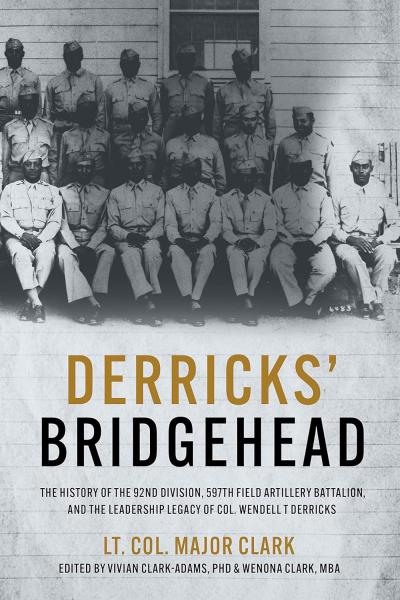| Title: | Derrick's Bridgehead - The 597th Field Artillery Battalion, 92nd Division, and the Leadership Legacy of Colonel Wendell T. |
| Writer: | Clark M., Clark-Adams V., Clark W. e.a. |
| Published: | Casemate |
| Published in: | 2023 |
| Pages: | 252 |
| Language: | English |
| ISBN: | 9781636242712 |
| Description: | There are few books about Black American units during the Second World War. In recent years, this focus has been shifting, by examining Black American units during the Second World War. The book is about the history of the 597th Field Artillery Battalions, one of the artillery battalions assigned to the 92nd Infantry Division. This book is a great tour de force, with having several objectives, to chronicle the history of the 597th Field Artillery Battalion, to narrate the military career of the writer, Major Clark, and to explain the impact of the battalion commander Colonel Wendell T. Derricks on the career of many young Black artillery officers. Major Clark started out as a private and eventually rose through the ranks to become a Lieutenant Colonel. His service includes the Second World War as well as the war in Korea. During the Second World War, he served as a young officer in the 597th Field Artillery Battalion, which was a component of the racially segregated 92nd Infantry Division. This was one of the few units with Black officers. Colonel Wendell T. Derricks had a unique position because he was one of the few Black high-ranking officers. Under the guidance of Colonel Derricks, the Black officers were rotated through a variety of positions. Thus they could gain field experience as well as staff experience, which would be invaluable later because Derricks envisioned that there would be a time when the officers would be judged on their experiences and qualities rather than the color of their skin. By the time the integration of the US Armed Forces was set in motion, these officers already had experiences that would make them equal to their white countrymen. On a personal level, I appreciated the remark near the end of the book. Clark is writing about some of the other officers he had met during his career, including the following fragment: "Lieutenant Colonel James Carr had served in the 614th Tank Destroyer Bn. in Central Europe during World War II. […] In the summer of 1958, he was reassigned as PMS&T at Hampton Institute, Virginia, where we had served together a few years before." The book does a good job of narrating the history of the unit as well as the military career. Although I had never heard of Colonel Derrick, after having finished the book, his actions and the significance of them are clear to me and, indeed, I can sympathize with the writer about why this book has been long overdue. It’s a tour de force, focusing on these three different aspects, but the author manages to deliver on each of them. The book is well-researched, an interesting read, and highly recommended. |
| Rating: |      (Excellent) (Excellent) |
Information
- Article by:
- Samuel de Korte
- Published on:
- 06-10-2024
- Feedback?
- Send it!



